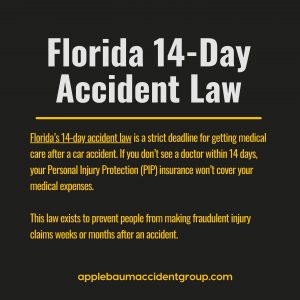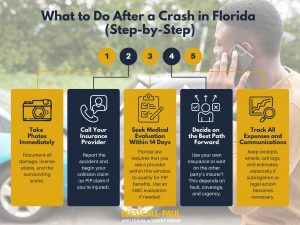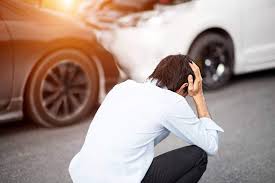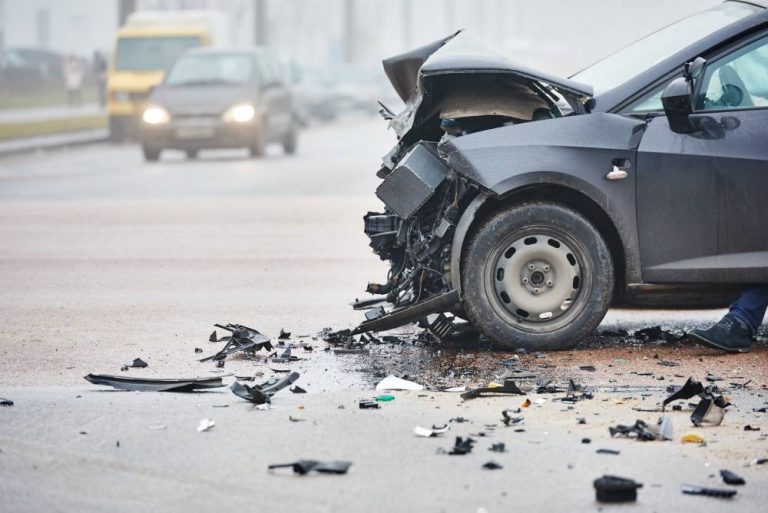So, you got into a car accident in Florida. Maybe it was just a fender bender, or maybe it shook you up a little more than you expected. Either way, you need to know about Florida’s 14-day accident law
If you don’t, you could lose out on thousands of dollars in insurance coverage.
Florida requires all drivers to carry Personal Injury Protection (PIP) insurance, which helps cover medical bills and lost wages after an accident—regardless of who was at fault.
But there’s a catch that many Florida drivers unfortunately don’t know about.
If you don’t seek medical treatment within 14 days of the crash, you forfeit your PIP benefits. That means your insurance company can legally deny paying for your injuries, even if you’re in pain.
Most people don’t realize how strict this rule is until it’s too late. And trust me, insurance companies love when people miss deadlines—it saves them money.
That’s why understanding how PIP works and what you need to do after an accident is crucial to protecting your rights (and your bank account).
Let’s break it all down so you know exactly what to do if you ever find yourself in this situation.
What is Florida’s 14-Day Accident Law?

Florida’s 14-day accident law is a strict deadline for getting medical care after a car accident. If you don’t see a doctor within 14 days, your Personal Injury Protection (PIP) insurance won’t cover your medical expenses. This law exists to prevent people from making fraudulent injury claims weeks or months after an accident.
A lot of legitimate accident victims lose their benefits just because they don’t know the rule. They feel fine at first, assume they’re okay, and then—boom—two weeks later, their back hurts, their neck is stiff, and they realize they should’ve gone to the doctor. By then, it’s too late for PIP to help.
Why Does This Matter?
PIP is supposed to cover up to $10,000 in medical bills and lost wages, regardless of who was at fault.
- If you don’t seek treatment within 14 days, you lose access to that coverage.
- If your injuries are considered “non-emergency,” PIP caps your benefits at $2,500.
- Only “Emergency Medical Conditions” (EMCs) qualify for the full $10,000.
What Counts as an Emergency Medical Condition (EMC)?

An EMC is a serious injury that, if left untreated, could cause major health problems or impair your ability to function. Think broken bones, head trauma, internal injuries—anything a doctor considers severe.
Here’s where people get tripped up.
Only certain medical providers can officially diagnose an EMC (like ER doctors, MDs, DOs, dentists, or physician assistants).
If you only see a chiropractor? No EMC diagnosis, no full PIP coverage.
Note: You must see a licensed medical professional within 14 days of your accident. However, this is different from receiving an EMC evaluation. To get full PIP coverage, you must receive an EMC evaluation. This can happen outside of the 14-day window.
Bottom Line?
Even if you feel fine, go to the doctor ASAP. Get checked out, get it documented, and protect your right to coverage. Because waiting too long could cost you thousands.
Understanding Personal Injury Protection (PIP) Insurance
Florida operates under a no-fault insurance system, which means that after a car accident, your own insurance company pays for your medical expenses and lost wages—regardless of who caused the crash.
This system is designed to ensure that accident victims receive immediate medical care without needing to establish fault or go through lengthy legal battles.
At the heart of Florida’s no-fault system is Personal Injury Protection (PIP) insurance, which is mandatory for all drivers. However, understanding what PIP covers—and what it doesn’t—is crucial for protecting your rights and financial well-being.
What Does PIP Cover?
PIP provides coverage for:
- Medical Expenses – Pays 80% of necessary medical treatment related to the accident, up to $10,000, if the injuries are classified as an Emergency Medical Condition (EMC).
- Lost Wages – Covers 60% of lost income if your injuries prevent you from working.
- Death Benefits – Provides up to $5,000 to the deceased’s family for funeral and burial costs.
Limitations on PIP Coverage
Not all injuries qualify for full PIP benefits. If your injuries are not deemed an Emergency Medical Condition (EMC), your PIP benefits are capped at $2,500.
Additionally:
- PIP does not cover pain and suffering—to recover compensation for emotional distress or long-term suffering, you may need to pursue a claim against the at-fault driver.
- PIP only covers the policyholder, household members, and certain passengers—it does not extend to everyone involved in the accident.
Why This Matters
Many accident victims assume PIP will cover all their medical bills, only to realize its limitations when expenses start piling up. Understanding these restrictions helps you make informed decisions about your medical care and whether you may need to seek compensation beyond PIP.
Steps to Take After an Accident

If you’ve been in a car accident, what you do next can make a huge difference—both for your health and your insurance claim. Florida’s laws are strict when it comes to getting medical treatment and securing Personal Injury Protection (PIP) benefits, so it’s essential to act fast and document everything properly.
Step 1: Immediate Actions at the Scene
- Call 911 and report the accident. Even if the damage seems minor, having an official police report can help support your insurance claim and protect you if the other driver changes their story later.
- Document everything. Take photos and videos of vehicle damage, license plates, road conditions, and any visible injuries. If there are witnesses, get their contact information—their statements can help if liability is disputed.
- Exchange insurance information with the other driver, but avoid admitting fault or speculating about what happened. Let the insurance companies and legal professionals determine fault based on the evidence.
Step 2: Seek Medical Attention ASAP
- The 14-day rule is strict. If you don’t seek medical treatment within two weeks, you lose your right to PIP benefits—even if you later develop symptoms.
- Where you go matters. Under Florida law, your initial treatment must be from a qualified medical provider, such as:
- Emergency rooms
- Urgent care centers
- Primary care physicians
- Chiropractors (though they cannot diagnose Emergency Medical Conditions, which are required for full PIP benefits)
- Licensed medical clinics
Many accident-related injuries, like whiplash or internal damage, don’t show symptoms immediately. Getting checked out ensures your injuries are documented and protects your right to insurance benefits.
Step 3: Filing a PIP Insurance Claim

- Notify your insurance company immediately. Delaying your claim can raise red flags and give insurers a reason to reduce or deny your benefits.
- Provide complete documentation. Your insurer will require medical records, accident reports, and treatment bills to process your claim. Missing or incomplete paperwork can delay or reduce your payout.
- Be cautious when speaking to insurers. Stick to the facts when giving your statement. Avoid admitting fault or downplaying injuries, as insurers may use this against you to limit their payout.
Don’t Make These Three Costly Mistakes
- Not seeking medical care right away – Even if you feel fine, you need an official medical evaluation within 14 days.
- Only seeing a chiropractor – While chiropractors can treat accident-related injuries, they cannot diagnose an Emergency Medical Condition (EMC), which is required to access the full $10,000 in PIP benefits.
- Giving recorded statements without legal advice – Insurers may try to minimize your injuries or twist your words to justify a lower settlement.
Taking the right steps after an accident not only protects your health but also ensures you receive the full benefits you’re entitled to.
Common Challenges with Florida’s 14-Day Rule
While Florida’s 14-day accident law is meant to ensure timely medical treatment, many accident victims face obstacles that can jeopardize their Personal Injury Protection (PIP) benefits.
Here are some of the most common challenges and how to navigate them.
1. Delayed Symptoms and Their Impact on Claims
It’s not uncommon for injuries—especially soft tissue injuries like whiplash—to appear days or even weeks after an accident. Many people initially feel fine due to adrenaline but later develop stiffness, pain, or mobility issues.
The problem? If you don’t seek treatment within 14 days, PIP won’t cover your medical expenses. Even if your symptoms worsen later, missing this deadline means losing your benefits.
✅ Solution: Even if you don’t feel injured, get checked out by a medical professional immediately. Early medical records strengthen your claim and prevent insurance companies from arguing that your injuries were unrelated to the accident.
2. Miscommunication with Insurers About Initial Injury Reports
Many accident victims make the mistake of telling insurance adjusters they aren’t injured, only to experience symptoms later. Insurers often use these statements against claimants, arguing that any reported injuries must have occurred after the accident—not because of it.
✅ Solution: When speaking with an insurance company, avoid definitive statements like “I’m fine” or “I’m not injured.” Instead, say “I’m seeking medical evaluation” or “I will follow up with a doctor.” This leaves room for later symptoms to be documented.
3. Claim Denials Due to Technicalities
Insurance companies often deny claims over minor details, such as:
- Missed deadlines (not seeing a doctor within 14 days).
- Lack of an Emergency Medical Condition (EMC) diagnosis, which limits PIP benefits to $2,500 instead of $10,000.
- Insufficient documentation, such as missing medical records or incomplete claim forms.
✅ Solution: Keep detailed records of all medical visits, diagnoses, and treatments. Make sure the provider documents that your injuries are accident-related and, if applicable, have them assess whether your injuries meet the EMC standard for full PIP coverage.
Legal Options Beyond PIP Coverage
Florida’s Personal Injury Protection (PIP) insurance is designed to cover medical expenses and lost wages, but it has serious limitations. PIP does not cover pain and suffering, and in many cases, its $10,000 cap isn’t enough to fully compensate an accident victim—especially for severe injuries.
If your injuries meet Florida’s “serious injury threshold”, you may be able to file a lawsuit against the at-fault driver for additional compensation. Here’s how it works.
1. Meeting the “Serious Injury Threshold”
Under Florida law, you can step outside the no-fault system and file a lawsuit if your injuries qualify as serious under Florida Statute 627.737. This includes:
- Permanent injury (a condition that will not fully heal).
- Significant and permanent scarring or disfigurement.
- Permanent loss of a bodily function.
- Death (a wrongful death claim can be filed by surviving family members).
If your injuries meet any of these criteria, you can pursue additional damages, including pain and suffering, emotional distress, and loss of enjoyment of life—things that PIP does not cover.
2. Filing a Lawsuit for More Compensation
Once you qualify under the serious injury threshold, you can seek compensation from the at-fault driver’s insurance or sue them directly if necessary. Compensation may include:
✅ Medical bills beyond PIP limits (including long-term rehabilitation and future treatments).
✅ Lost wages and reduced earning capacity (if your injuries prevent you from working).
✅ Pain and suffering (physical pain, emotional trauma, and overall impact on quality of life).
✅ Punitive damages (if the at-fault driver was reckless, such as in DUI cases).
3. The Role of Uninsured/Underinsured Motorist (UM/UIM) Coverage
Not every driver in Florida carries adequate insurance—some have low policy limits, and others have no insurance at all. If you’re hit by an uninsured or underinsured driver, your ability to recover damages could be severely limited—unless you have UM/UIM coverage.
- Uninsured Motorist (UM) Coverage: Helps pay for your medical bills, lost wages, and pain and suffering if the at-fault driver has no insurance.
- Underinsured Motorist (UIM) Coverage: Covers the gap if the at-fault driver’s insurance isn’t enough to cover all your damages.
Many accident victims don’t realize the importance of UM/UIM coverage until it’s too late. While Florida does not require drivers to carry it, having this coverage can make a massive difference if you’re involved in a serious accident.
Navigating This Confusing System
Florida’s personal injury laws and PIP insurance rules can be confusing, especially if you’ve never had to deal with an accident before. Unfortunately, insurance companies don’t make it easy—they look for ways to minimize payouts, and one small mistake can cost you thousands.
One thing you can do is consult multiple attorneys before signing any agreement.
Not all attorneys are the same, and the lawyer you choose can make or break your case. Some firms take on high volumes of cases and settle quickly, often for less than you deserve. Others may charge high fees that eat into your settlement.
What to do:
- Meet with multiple attorneys before making a decision.
- Ask about their experience with Florida’s 14-day rule and serious injury cases.
- Understand their fee structure—most personal injury lawyers work on contingency, meaning they only get paid if you win.
A good lawyer will be upfront, transparent, and focused on your best interests—not just a quick settlement.
How Applebaum Accident Group Can Help

Dealing with an accident is overwhelming. Between medical bills, insurance headaches, and legal deadlines, it’s easy to feel lost. That’s where Applebaum Accident Group comes in.
We connect accident victims with top-rated attorneys who know how to navigate Florida’s complex insurance laws and fight for maximum compensation. Whether you need help filing a claim, negotiating with insurers, or pursuing a lawsuit, we ensure you’re in the best hands.
The clock is ticking.
If you’ve been in an accident, don’t wait—call Applebaum Accident Group today. We’ll put you in touch with the right professionals to protect your rights and get you the compensation you deserve.





